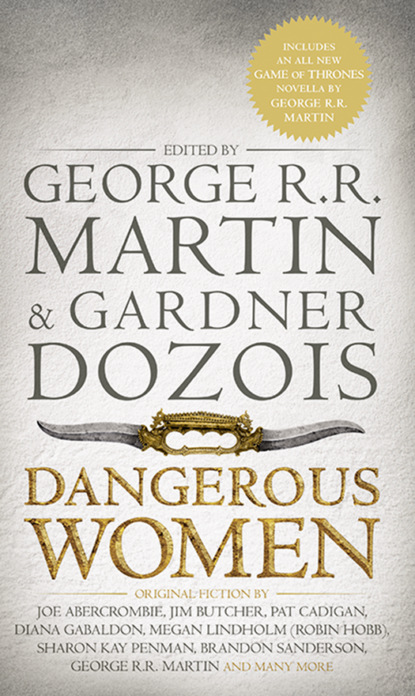
Полная версия
Dangerous Women. Part I
Dawn was breaking over the city before Queen Alicent dispatched the Kingsguard to bring her sons to the council. Prince Daeron, the gentlest of her children, wept for his grandsire’s passing. One-eyed Prince Aemond, nineteen, was found in the armory, donning plate and mail for his morning practice in the castle yard. “Is Aegon king,” he asked Ser Willis Fell, “or must we kneel and kiss the old whore’s cunny?” Princess Helaena was breaking her fast with her children when the Kingsguard came to her … but when asked the whereabouts of Prince Aegon, her brother and husband, said only, “He is not in my bed, you may be sure. Feel free to search beneath the blankets.”
Prince Aegon was with a paramour when he was found. At first, the prince refused to be a part of his mother’s plans. “My sister is the heir, not me,” he said. “What sort of brother steals his sister’s birthright?” Only when Ser Criston convinced him that the princess must surely execute him and his brothers should she don the crown did Aegon waver. “Whilst any trueborn Targaryen yet lives, no Strong can ever hope to sit the Iron Throne,” Cole said. “Rhaenyra has no choice but to take your heads if she wishes her bastards to rule after her.” It was this, and only this, that persuaded Aegon to accept the crown that the small council was offering him,
Ser Tyland Lannister was named master of coin in place of the late Lord Beesbury, and acted at once to seize the royal treasury. The crown’s gold was divided into four parts. One part was entrusted to the care of the Iron Bank of Braavos for safekeeping, another sent under strong guard to Casterly Rock, a third to Oldtown. The remaining wealth was to be used for bribes and gifts, and to hire sellswords if needed. To take Ser Tyland’s place as master of ships, Ser Otto looked to the Iron Islands, dispatching a raven to Dalton Greyjoy, the Red Kraken, the daring and bloodthirsty sixteen-year-old Lord Reaper of Pyke, offering him the admiralty and a seat on the council for his allegiance.
A day passed, then another. Neither septons nor silent sisters were summoned to the bedchamber where King Viserys lay, swollen and rotting. No bells rang. Ravens flew, but not to Dragonstone. They went instead to Oldtown, to Casterly Rock, to Riverrun, to Highgarden, and to many other lords and knights whom Queen Alicent had cause to think might be sympathetic to her son.
The annals of the Great Council of 101 were brought forth and examined, and note was made of which lords had spoken for Viserys, and which for Rhaenys, Laena, or Laenor. The lords assembled had favored the male claimant over the female by twenty to one, but there had been dissenters, and those same houses were most like to lend Princess Rhaenyra their support should it come to war. The princess would have the Sea Snake and his fleets, Ser Otto judged, and like as not the other lords of the eastern shores as well: Lords Bar Emmon, Massey, Celtigar, and Crabb most like, perhaps even the Evenstar of Tarth. All were lesser powers, save for the Velaryons. The northmen were a greater concern: Winterfell had spoken for Rhaenys at Harrenhal, as had Lord Stark’s bannermen, Dustin of Barrowton and Manderly of White Harbor. Nor could House Arryn be relied upon, for the Eyrie was presently ruled by a woman, Lady Jeyne, the Maiden of the Vale, whose own rights might be called into question should Princess Rhaenyra be put aside.
The greatest danger was deemed to be Storm’s End, for House Baratheon had always been staunch in support of the claims of Princess Rhaenys and her children. Though old Lord Boremund had died, his son Borros was even more belligerent than his father, and the lesser storm lords would surely follow wherever he led. “Then we must see that he leads them to our king,” Queen Alicent declared. Whereupon she sent for her second son.
Thus it was not a raven who took flight for Storm’s End that day, but Vhagar, oldest and largest of the dragons of Westeros. On her back rode Prince Aemond Targaryen, with a sapphire in the place of his missing eye. “Your purpose is to win the hand of one of Lord Baratheon’s daughters,” his grandsire Ser Otto told him, before he flew. “Any of the four will do. Woo her and wed her, and Lord Borros will deliver the stormlands for your brother. Fail—”
“I will not fail,” Prince Aemond blustered. “Aegon will have Storm’s End, and I will have this girl.”
By the time Prince Aemond took his leave, the stink from the dead king’s bedchamber had wafted all through Maegor’s Holdfast, and many wild tales and rumors were spreading through the court and castle. The dungeons under the Red Keep had swallowed up so many men suspected of disloyalty that even the High Septon had begun to wonder at these disappearances, and sent word from the Starry Sept of Oldtown asking after some of the missing. Ser Otto Hightower, as methodical a man as ever served as Hand, wanted more time to make preparations, but Queen Alicent knew they could delay no longer. Prince Aegon had grown weary of secrecy. “Am I a king, or no?” he demanded of his mother. “If I am king, then crown me.”
The bells began to ring on the tenth day of the third moon of 129 AC, tolling the end of a reign. Grand Maester Orwyle was at last allowed to send forth his ravens, and the black birds took to the air by the hundreds, spreading the word of Aegon’s ascension to every far corner of the realm. The silent sisters were sent for, to prepare the corpse for burning, and riders went forth on pale horses to spread the word to the people of King’s Landing, crying, “King Viserys is dead, long live King Aegon.” Hearing the cries, some wept whilst others cheered, but most of the smallfolk stared in silence, confused and wary, and now and again a voice cried out, “Long live our queen.”
Meanwhile, hurried preparations were made for the coronation. The Dragonpit was chosen as the site. Under its mighty dome were stone benches sufficient to seat eighty thousand, and the pit’s thick walls, strong roof, and towering bronze doors made it defensible, should traitors attempt to disrupt the ceremony.
On the appointed day Ser Criston Cole placed the iron-and-ruby crown of Aegon the Conquerer upon the brow of the eldest son of King Viserys and Queen Alicent, proclaiming him Aegon of House Targaryen, Second of His Name, King of the Andals and the Rhoynar and the First Men, Lord of the Seven Kingdoms, and Protector of the Realm. His mother Queen Alicent, beloved of the smallfolk, placed her own crown upon the head of her daughter Helaena, Aegon’s wife and sister. After kissing her cheeks, the mother knelt before the daughter, bowed her head, and said, “My queen.”
With the High Septon in Oldtown, too old and frail to journey to King’s Landing, it fell to Septon Eustace to anoint King Aegon’s brow with holy oils, and bless him in the seven names of god. A few of those in attendance, with sharper eyes than most, may have noticed that there were but four white cloaks in attendance on the new king, not five as heretofore. Aegon II had suffered his first defections the night before, when Ser Steffon Darklyn of the Kingsguard had slipped from the city with his squire, two stewards, and four guardsmen. Under the cover of darkness they made their way out a postern gate to where a fisherman’s skiff awaited to take them to Dragonstone. They brought with them a stolen crown: a band of yellow gold ornamented with seven gems of different colors. This was the crown King Viserys had worn, and the Old King Jaehaerys before him. When Prince Aegon had decided to wear the iron-and-ruby crown of his namesake, the Conquerer, Queen Alicent had ordered Viserys’s crown locked away, but the steward entrusted with the task had made off with it instead.
After the coronation, the remaining Kingsguard escorted Aegon to his mount, a splendid creature with gleaming golden scales and pale pink wing membranes. Sunfyre was the name given this dragon of the golden dawn. Munkun tells us the king flew thrice around the city before landing inside the walls of the Red Keep. Ser Arryk Cargyll led His Grace into the torchlit throne room, where Aegon II mounted the steps of the Iron Throne before a thousand lords and knights. Shouts rang through the hall.
On Dragonstone, no cheers were heard. Instead, screams echoed through the halls and stairwells of Sea Dragon Tower, down from the queen’s apartments where Rhaenyra Targaryen strained and shuddered in her third day of labor. The child had not been due for another turn of the moon, but the tidings from King’s Landing had driven the princess into a black fury, and her rage seemed to bring on the birth, as if the babe inside her were angry too, and fighting to get out. The princess shrieked curses all through her labor, calling down the wroth of the gods upon her half brothers and their mother the queen, and detailing the torments she would inflict upon them before she would let them die. She cursed the child inside her too. “Get out,” she screamed, clawing at her swollen belly as her maester and her midwife tried to restrain her. “Monster, monster, get out, get out, GET OUT!”
When the babe at last came forth, she proved indeed a monster: a stillborn girl, twisted and malformed, with a hole in her chest where her heart should have been and a stubby, scaled tail. The dead girl had been named Visenya, Princess Rhaenyra announced the next day, when milk of the poppy had blunted the edge of her pain. “She was my only daughter, and they killed her. They stole my crown and murdered my daughter, and they shall answer for it.”
And so the dance began, as the princess called a council of her own. “The black council,” setting it against the “green council” of King’s Landing. Rhaenyra herself presided, with her uncle and husband Prince Daemon. Her three sons were present with them, though none had reached the age of manhood (Jace was fifteen, Luke fourteen, Joffrey twelve). Two Kingsguard stood with them: Ser Erryk Cargyll, twin to Ser Arryk, and the westerman, Ser Lorent Marbrand. Thirty knights, a hundred crossbowmen, and three hundred men-at-arms made up the rest of Dragonstone’s garrison. That had always been deemed sufficient for a fortress of such strength. “As an instrument of conquest, however, our army leaves somewhat to be desired,” Prince Daemon observed sourly.
A dozen lesser lords, bannermen and vassals to Dragonstone, sat at the black council as well: Celtigar of Claw Isle, Staunton of Rook’s Rest, Massey of Stonedance, Bar Emmon of Sharp Point, and Darklyn of Duskendale amongst them. But the greatest lord to pledge his strength to the princess was Corlys Velaryon of Driftmark. Though the Sea Snake had grown old, he liked to say that he was clinging to life “like a drowning sailor clinging to the wreckage of a sunken ship. Mayhaps the Seven have preserved me for this one last fight.” With Lord Corlys came his wife Princess Rhaenys, five-and-fifty, her face lean and lined, her silver hair streaked with white, yet fierce and fearless as she had been at two-and-twenty – a woman sometimes known among the smallfolk as “The Queen Who Never Was.”
Those who sat at the black council counted themselves loyalists, but knew full well that King Aegon II would name them traitors. Each had already received a summons from King’s Landing, demanding they present themselves at the Red Keep to swear oaths of loyalty to the new king. All their hosts combined could not match the power the Hightowers alone could field. Aegon’s greens enjoyed other advantages as well. Oldtown, King’s Landing, and Lannisport were the largest and richest cities in the realm; all three were held by greens. Every visible symbol of legitimacy belonged to Aegon. He sat the Iron Throne. He lived in the Red Keep. He wore the Conquerer’s crown, wielded the Conquerer’s sword, and had been anointed by a septon of the Faith before the eyes of tens of thousands. Grand Maester Orwyle sat in his councils, and the Lord Commander of the Kingsguard had placed the crown upon his princely head. And he was male, which in the eyes of many made him the rightful king, his half sister the usurper.
Against all that, Rhaenyra’s advantages were few. Some older lords might yet recall the oaths they had sworn when she was made Princess of Dragonstone and named her father’s heir. There had been a time when she had been well loved by highborn and commons alike, when they had cheered her as the Realm’s Delight. Many a young lord and noble knight had sought her favor then … though how many would still fight for her, now that she was a woman wed, her body aged and thickened by six childbirths, was a question none could answer. Though her half brother had looted their father’s treasury, the princess had at her disposal the wealth of House Velaryon, and the Sea Snake’s fleets gave her superiority at sea. And her consort Prince Daemon, tried and tempered in the Stepstones, had more experience of warfare than all their foes combined. Last, but far from least, Rhaenyra had her dragons.
“As does Aegon,” Lord Staunton pointed out.
“We have more,” said Princess Rhaenys, the Queen Who Never Was, who had been a dragonrider longer than all of them. “And ours are larger and stronger, but for Vhagar. Dragons thrive best here on Dragonstone.” She enumerated for the council. King Aegon had his Sunfyre. A splendid beast, though young. Aemond One-Eye rode Vhagar, and the peril posed by Queen Visenya’s mount could not be gainsaid. Queen Helaena’s mount was Dreamfyre, the she-dragon who had once borne the Old King’s sister Rhaena through the clouds. Prince Daeron’s dragon was Tessarion, with her wings dark as cobalt and her claws and crest and belly scales as bright as beaten copper. “That makes four dragons of fighting size,” said Rhaenys. Queen Helaena’s twins had their own dragons too, but no more than hatchlings; the usurper’s youngest son, Maelor, was possessed only of an egg.
Against that, Prince Daemon had Caraxes and Princess Rhaenyra Syrax, both huge and formidable beasts. Caraxes especially was fearsome, and no stranger to blood and fire after the Stepstones. Rhaenyra’s three sons by Laenor Velaryon were all dragonriders; Vermax, Arrax, and Tyraxes were thriving, and growing larger every year. Aegon the Younger, eldest of Rhaenyra’s two sons by Prince Daemon, commanded the young dragon Stormcloud, though he had yet to mount him; his little brother Viserys went everywhere with his egg. Rhaenys’s own she-dragon, Meleys the Red Queen, had grown lazy, but remained fearsome when roused. Prince Daemon’s twins by Laena Velaryon might yet be dragonriders too. Baela’s dragon, the slender pale green Moondancer, would soon be large enough to bear the girl upon her back … and though her sister Rhaena’s egg had hatched a broken thing that died within hours of emerging from the egg, Syrax had recently produced another clutch. One of her eggs had been given to Rhaena, and it was said that the girl slept with it every night, and prayed for a dragon to match her sister’s.
Moreover, six other dragons made their lairs in the smoky caverns of the Dragonmont above the castle. There was Silverwing, Good Queen Alysanne’s mount of old; Seasmoke, the pale grey beast that had been the pride and passion of Ser Laenor Velaryon; hoary old Vermithor, unridden since the death of King Jaehaerys. And back of the mountain dwelled three wild dragons, never claimed nor ridden by any man, living or dead. The smallfolk had named them Sheepstealer, Grey Ghost, and the Cannibal. “Find riders to master Silverwing, Vermithor, and Seasmoke, and we will have nine dragons against Aegon’s four. Mount and fly their wild kin, and we will number twelve, even without Stormcloud,” Princess Rhaenys pointed out. “That is how we shall win this war.”
Lords Celtigar and Staunton agreed. Aegon the Conquerer and his sisters had proved that knights and armies could not stand against the fire of dragons. Celtigar urged the princess to fly against King’s Landing at once, and reduce the city to ash and bone. “And how will that serve us, my lord?” the Sea Snake demanded of him. “We want to rule the city, not burn it to the ground.”
“It will never come to that,” Celtigar insisted. “The usurper will have no choice but to oppose us with his own dragons. Our nine must surely overwhelm his four.”
“At what cost?” Princess Rhaenyra wondered. “My sons would be riding three of those dragons, I remind you. And it would not be nine against four. I will not be strong enough to fly for some time yet. And who is to ride Silverwing, Vermithor, and Seasmoke? You, my lord? I hardly think so. It will be five against four, and one of their four will be Vhagar. That is no advantage.”
Surprisingly, Prince Daemon agreed with his wife. “In the Stepstones, my enemies learned to run and hide when they saw Caraxes’s wings or heard his roar … but they had no dragons of their own. It is no easy thing for a man to be a dragonslayer. But dragons can kill dragons, and have. Any maester who has ever studied the history of Valyria can tell you that. I will not throw our dragons against the usurper’s unless I have no other choice. There are other ways to use them, better ways.” Then the prince laid his own strategies before the black council. Rhaenyra must have a coronation of her own, to answer Aegon’s. Afterward they would send out ravens, calling on the lords of the Seven Kingdoms to declare their allegiance to their true queen.
“We must fight this war with words before we go to battle,” the prince declared. The lords of the Great Houses held the key to victory, Daemon insisted; their bannermen and vassals would follow where they led. Aegon the Usurper had won the allegiance of the Lannisters of Casterly Rock, and Lord Tyrell of Highgarden was a mewling boy in swaddling clothes whose mother, acting as his regent, would most like align the Reach with her overmighty bannermen, the Hightowers … but the rest of the realm’s great lords had yet to declare.
“Storm’s End will stand with us,” Princess Rhaenys declared. She herself was of that blood on her mother’s side, and the late Lord Boremund had always been the staunchest of friends.
Prince Daemon had good reason to hope that the Maid of the Vale might bring the Eyrie to their side as well. Aegon would surely seek the support of Pyke, he judged; only the Iron Islands could hope to match the strength of House Velaryon at sea. But the ironmen were notoriously fickle, and Dalton Greyjoy loved blood and battle; he might easily be persuaded to support the princess.
The north was too remote to be of much import in the fight, the council judged; by the time the Starks gathered their banners and marched south, the war might well be over. Which left only the riverlords, a notoriously quarrelsome lot ruled over, in name at least, by House Tully of Riverrun. “We have friends in the riverlands,” the prince said, “though not all of them dare show their colors yet. We need a place where they can gather, a toehold on the mainland large enough to house a sizeable host, and strong enough to hold against whatever forces the usurper can send against us.” He showed the lords a map. “Here. Harrenhal.”
And so it was decided. Prince Daemon would lead the assault on Harrenhal, riding Caraxes. Princess Rhaenyra would remain on Dragonstone until she had recovered her strength. The Velaryon fleet would close off the Gullet, sallying forth from Dragonstone and Driftmark to block all shipping entering or leaving Blackwater Bay. “We do not have the strength to take King’s Landing by storm,” Prince Daemon said, “no more than our foes could hope to capture Dragonstone. But Aegon is a green boy, and green boys are easily provoked. Mayhaps we can goad him into a rash attack.” The Sea Snake would command the fleet, whilst Princess Rhaenys flew overhead to keep their foes from attacking their ships with dragons. Meanwhile, ravens would go forth to Riverrun, the Eyrie, Pyke, and Storm’s End, to gain the allegiance of their lords.
Then up spoke the queen’s eldest son, Jacaerys. “We should bear those messages,” he said. “Dragons will win the lords over quicker than ravens.” His brother Lucerys agreed, insisting that he and Jace were men, or near enough to make no matter. “Our uncle calls us Strongs, and claims that we are bastards, but when the lords see us on dragonback they will know that for a lie. Only Targaryens ride dragons.” Even young Joffrey chimed in, offering to mount his own dragon Tyraxes and join his brothers.
Princess Rhaenyra forbade that; Joff was but twelve. But Jacaerys was fifteen, Lucerys fourteen; strong and strapping lads, skilled in arms, who had long served as squires. “If you go, you go as messengers, not as knights,” she told them. “You must take no part in any fighting.” Not until both boys had sworn solemn oaths upon a copy of The Seven-Pointed Star would Her Grace consent to using them as her envoys. It was decided that Jace, being the older of the two, would take the longer, more dangerous task, flying first to the Eyrie to treat with the Lady of the Vale, then to White Harbor to win over Lord Manderly, and lastly to Winterfell to meet with Lord Stark. Luke’s mission would be shorter and safer; he was to fly to Storm’s End, where it was expected that Borros Baratheon would give him a warm welcome.
A hasty coronation was held the next day. The arrival of Ser Steffon Darklyn, late of Aegon’s Kingsguard, was an occasion of much joy on Dragonstone, especially when it was learned that he and his fellow loyalists (“turncloaks,” Ser Otto would name them, when offering a reward for their capture) had brought the stolen crown of King Jaehaerys the Conciliator. Three hundred sets of eyes looked on as Prince Daemon Targaryen placed the Old King’s crown on the head of his wife, proclaiming her Rhaenyra of House Targaryen, First of Her Name, Queen of the Andals, the Rhoynar, and the First Men. The prince claimed for himself the style Protector of the Realm, and Rhaenyra named her eldest son, Jacaerys, the Prince of Dragonstone and heir to the Iron Throne.
Her first act as queen was to declare Ser Otto Hightower and Queen Alicent traitors and rebels. “As for my half brothers, and my sweet sister Helaena,” she announced, “they have been led astray by the counsel of evil men. Let them come to Dragonstone, bend the knee, and ask my forgiveness, and I shall gladly spare their lives and take them back into my heart, for they are of my own blood, and no man or woman is as accursed as the kinslayer.”
Word of Rhaenyra’s coronation reached the Red Keep the next day, to the great displeasure of Aegon II. “My half sister and my uncle are guilty of high treason,” the young king declared. “I want them attainted, I want them arrested, and I want them dead.”
Cooler heads on the green council wished to parlay. “The princess must be made to see that her cause is hopeless,” Grand Maester Orwyle said. “Brother should not war against sister. Send me to her, that we may talk and reach an amicable accord.”
Aegon would not hear of it. Septon Eustace tells us that His Grace accused the grand maester of disloyalty and spoke of having him thrown into a black cell “with your black friends.” But when the two queens – his mother Queen Alicent and his wife Queen Helaena – spoke in favor of Orwyle’s proposal, the king gave way reluctantly. So Grand Maester Orwyle was dispatched across Blackwater Bay under a peace banner, leading a retinue that included Ser Arryk Cargyll of the Kingsguard and Ser Gwayne Hightower of the gold cloaks, along with a score of scribes and septons.
The terms offered by the king were generous. If the princess would acknowledge him as king and make obeisance before the Iron Throne, Aegon II would confirm her in her possession of Dragonstone, and allow the island and castle to pass to her son Jacaerys upon her death. Her second son, Lucerys, would be recognized as the rightful heir to Driftmark, and the lands and holdings of House Velaryon; her boys by Prince Daemon, Aegon the Younger and Viserys, would be given places of honor at court, the former as the king’s squire, the latter as his cupbearer. Pardons would be granted to those lords and knights who had conspired treasonously with her against their true king.
Rhaenyra heard these terms in stony silence, then asked Orwyle if he remembered her father, King Viserys. “Of course, Your Grace,” the maester answered. “Perhaps you can tell us who he named as his heir and successor,” the queen said, her crown upon her head. “You, Your Grace,” Orwyle replied. And Rhaenyra nodded and said, “With your own tongue you admit I am your lawful queen. Why then do you serve my half brother, the pretender? Tell my half brother that I will have my throne, or I will have his head,” she said, sending the envoys on their way.










